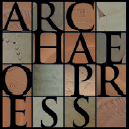
Publishing Scholarly Archaeology since 1997

Download Sample PDF
H 290 x W 205 mm
598 pages
392 figures, 10 sections, 87 tables (colour throughout)
Published Jun 2024
ISBN
Hardback: 9781803277080
Digital: 9781803277097
Keywords
St Albans; Middle Ages; Abbey; Chapter House; Decorated Floor Tiles; Excavations
Related titles




St Albans Abbey: The Excavation of the Chapter House 1978
Edited by Martin Biddle, Birthe Kjølbye-Biddle, Megan Kirkpatrick, Francis M. Morris
Excavations at the site of the medieval chapter house of St Albans Abbey in 1978 uncovered fragments of decorated floor tiles of the Anglo-Saxon abbey and associated burials, along with the magnificent floor of relief-decorated tiles of the medieval chapter house, and the graves of 16 known figures of the late 11th-to 15th-century abbey.
Contents
PART 1. INTRODUCTION
1. Introduction
PART 2. THE ARCHAEOLOGICAL EVIDENCE
1. The Geology of the Site
2. The Site Before the Building of the Chapter House
3. The Chapter Houses
4. The Slype
5. The East Cloister Walk
6. The Dorter Range
7. The Areas around the Chapter House
PART 3. THE ARCHITECTURE AND DECORATION OF THE CHAPTER HOUSE
1. The Building Stones
2. The Tiled Floors of the Chapter House
3. The Sculpture and Mouldings of the Third (Rectangular) Chapter House
4. The Pigments Used in Painting the Sculpture of the Third (Romanesque) Chapter House of 1151–66 and a Gothic Screen of c.1325–50
5. The Ironwork of the (Romanesque) Door of the Slype
6. The Architecture of the Fourth Vaulted Fifteenth-Century Chapter House
7. The Window Glass and Leading of the Fifteenth-Century Chapter House
8. Slip-Decorated and Plain Floor Tiles
9. The Repaving of the Presbytery in the 1870s Using Minton Tiles Copied from the Paving of the Third Chapter House
PART 4. BURIALS
1. Burials Before the Chapter House: The Skeletal Remains
2. Burials in the Chapter House: Identification, Written Evidence, and Discussion
3. Burials in the Chapter House: The Skeletal Remains
4. Coffins
5. Marble Tomb Slabs
6. The Purbeck Marble Indent for a Brass of Master Adam Rous and Indents of Brasses Found in the Shrine of St Alban
7. The Reburial in the Presbytery in 1979 of the Abbots and Others Buried in the Medieval Chapter House
PART 5. FINDS
1. Coins and tokens
2. Papal Bulla
3. Stirrup-Shaped Gold Ring
4. Gold Thread trom the Grave of Abbot Warin of Cambridge
5. Ivory Crozier of Abbot Warin of Cambridge
6. Pewter Chalice from the Grave of Robert of the Chamber (d.1154 x 1160)
7. Gilt Copper-Alloy Disc Probably from a Brooch
8. Copper-Alloy Hooked Fastener
9. Objects of Copper Alloy and Gold
10. Ironwork
11. Lead Objects
12. Bone Objects
13. Neolithic Polished Axe and Worked Flints
14. Roman Vessel and Window Glass
15. Medieval Vessel Glass
16. Roman Glass Beads
17. Lava and Sandstone Querns
18. Pottery
19. Clay Tobacco Pipes
20. Animal Bones
21. Modern Coffin Furniture
APPENDICES
Appendix I. Burials in the Chapter House
Appendix II. Sections
About the Author
Professor Martin Biddle is an Emeritus Fellow of Hertford College, Oxford, and Honorary Fellow of Pembroke College, Cambridge. He was the first Lecturer in Medieval Archaeology in England, at the University of Exeter (1963–67) and he has held many other distinguished academic positions worldwide. He is the Founder and Director of the Winchester Excavations Committee (1962–present) and was the Archaeological Consultant at St Albans Cathedral until 2023.
Birthe Kjølbye-Biddle was a Danish archaeologist who transformed approaches to archaeological excavation in England. She introduced metric measurements and imposed new standards of rigour in excavation, stratigraphic recording, and analysis. These were adopted throughout the work of the Winchester Excavations Committee which she joined in 1964. This technical brilliance provided the basis for her forthcoming posthumous publication of the archaeology of the Anglo-Saxon minsters of Winchester.
Megan Kirkpatrick is completing a DPhil. in Medieval Archaeology at the University of Oxford. This focusses on the medieval castles of Wales, but she has a keen interest in heritage in the Middle East as well as in Wales, and has collaborated with organisations such as the Aerial Photographic Archive for Archaeology in the Middle East. She currently works for the Commonwealth Heritage Forum.
Francis M. Morris took a DPhil. in Archaeology at the University of Oxford in 2010 and subsequently worked at the Oxford Celtic Coin Index and on the preparation of this book. Since 2012 he has contributed to the publication of books in the Winchester Studies series, especially on WS 3.i Venta Belgarum: Prehistoric, Roman and Post-Roman Winchester, WS 4.i The Anglo-Saxon Minsters of Winchester (forthcoming), and WS 11 The British Historic Towns Atlas of Winchester. He currently works for Archaeological Research Services.

 Add to wishlist
Add to wishlist
